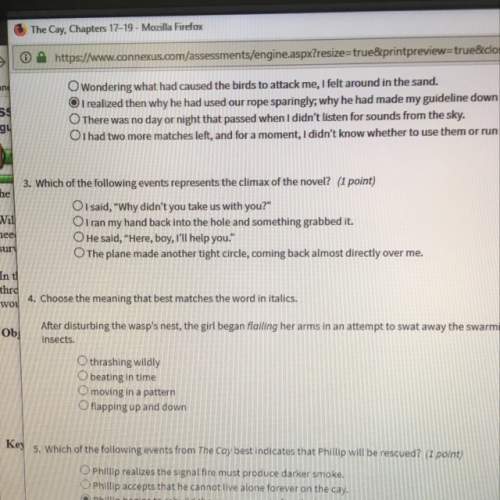
Read again the first part of the Source from lines 1 to 6.
List four things about the Jack-in-the-box from this part of the Source.
1.
2.
3.
4.
The children did not play with it. It sat at the bottom of the old wooden toy box,
which was the same size and age as a pirate’s treasure-chest, or so the
children thought. The Jack-in-the-box was buried beneath dolls and trains,
clowns and paper stars and old conjuring tricks, and crippled marionettes with
their strings irrevocably tangled, with dressing up clothes (here the tatters of a
long-ago wedding dress, there a black silk hat, crusted with age and time) and
costume jewellery, broken hoops and tops and hobbyhorses. Under them all
was the Jack’s box.

Answers: 3
Another question on English

English, 21.06.2019 21:00
For which cause did swift not write? the tory government the devaluation of irish coins the whig wars under william iii the starvation in ireland
Answers: 3

English, 21.06.2019 22:20
What do we know about the mother in “two kinds”? select all that apply. she came from china. she had two daughters who died. her mother, father, and first husband are dead. she is part japanese.
Answers: 1

English, 22.06.2019 00:00
Jeff's response to justin assumes that justin is following which maxim? justin: hey, jeff! jeff: yeah? justin: get ready for the news of the day! jeff: okay. justin: i got that job i was after! jeff: wow! that's great! justin: ! starts right now! later!
Answers: 2

English, 22.06.2019 04:50
Read the passage, then answer the question that follows. no one could have seen it at the time, but the invention of beet sugar was not just a challenge to cane. it was a hint—just a glimpse, like a twist that comes about two thirds of the way through a movie—that the end of the age of sugar was in sight. for beet sugar showed that in order to create that perfect sweetness you did not need slaves, you did not need plantations, in fact you did not even need cane. beet sugar was a foreshadowing of what we have today: the age of science, in which sweetness is a product of chemistry, not whips. in 1854 only 11 percent of world sugar production came from beets. by 1899 the percentage had risen to about 65 percent. and beet sugar was just the first challenge to cane. by 1879 chemists discovered saccharine—a laboratory-created substance that is several hundred times sweeter than natural sugar. today the sweeteners used in the foods you eat may come from corn (high-fructose corn syrup), from fruit (fructose), or directly from the lab (for example, aspartame, invented in 1965, or sucralose—splenda—created in 1976). brazil is the land that imported more africans than any other to work on sugar plantations, and in brazil the soil is still perfect for sugar. cane grows in brazil today, but not always for sugar. instead, cane is often used to create ethanol, much as corn farmers in america now convert their harvest into fuel. –sugar changed the world, marc aronson and marina budhos how does this passage support the claim that sugar was tied to the struggle for freedom? it shows that the invention of beet sugar created competition for cane sugar. it shows that technology had a role in changing how we sweeten our foods. it shows that the beet sugar trade provided jobs for formerly enslaved workers. it shows that sweeteners did not need to be the product of sugar plantations and slavery.
Answers: 1
You know the right answer?
Read again the first part of the Source from lines 1 to 6.
List four things about the Jack-in-the-b...
Questions









History, 28.07.2019 00:00



Social Studies, 28.07.2019 00:00

Biology, 28.07.2019 00:00

English, 28.07.2019 00:00



Biology, 28.07.2019 00:00

Biology, 28.07.2019 00:00


Business, 28.07.2019 00:00




